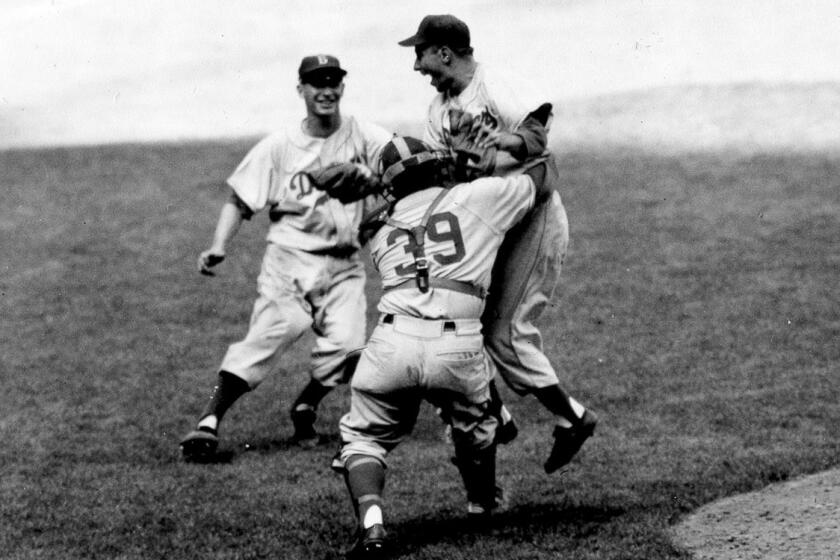Pee Wee Was a Giant
- Share via
Harold Henry Reese has died, and all you need to know is that Pee Wee wasn’t even his most important nickname.
“We called him ‘Captain,’ ” former teammate George Shuba said. “That’s what we was. That’s who he was.”
When is the last time anybody on the Dodgers had that nickname?
When is the last time the Dodgers even had a captain?
Pee Wee Reese has died, and a franchise’s legacy slips further below the horizon, hastening an approaching darkness broken only by the sounds of expletives.
With Reese go the memories of a time when a 5-foot-10 kid from Kentucky could lead a team of big-city heroes, when a man was not judged by numbers or highlights, when a man could make an impact simply by putting his arm around another man.
That was Reese’s shining moment, the one that defined him, on May 14, 1947, when he diffused the first angry reaction to Jackie Robinson’s breaking of baseball’s color barrier.
Amid jeers from fans in Cincinnati’s Crosley Field, Reese walked over from his shortstop position to drape his arm around Robinson.
Seeing that a white Southerner felt that way about a black player, the crowd quieted, and Robinson was given the first show of support he would need to endure.
“I don’t even remember what he said,” Robinson wrote later. “It was the gesture of comradeship and support that counted.”
Imagine the impact of a simple gesture from a courageous man on the Dodgers of today.
“Pee Wee Reese was the sort of man who would have taken Raul Mondesi in a back room and said, ‘We can’t have this,’ ” speculated Tot Holmes, Dodger historian. “He was the player who settled things. He was the player the Dodgers need right now.”
But just as baseball’s wonder days from 1940-58 no longer exist, neither does such a player.
Everyone called him Pee Wee, not because of his size but because he was a marbles expert and used the “peewee” marble. Yet who plays marbles anymore when you can decapitate people with a joystick and a TV screen?
Pee Wee is in the Hall of Fame. Yet he batted above .300 only once and led the league only twice in an offensive category and once in fielding.
Pee Wee was known as the ultimate winner. Yet he won only one World Series championship.
Pee Wee was a Dodger who became a hero without bells and whistles, without attitude or shtick. He was a Dodger who became a hero simply by being a good Dodger.
“Everybody on the team went to Pee Wee for everything,” Shuba said. “If you had a problem, you knew he would keep it confidential. Everybody liked him.”
Imagine that. A Dodger everybody likes. A Dodger who put his team first.
“Pee Wee was always the guy who tried to make things better,” said Don Newcombe, another former teammate.
There are the stories of Reese walking to the mound in the middle of a game, alone and unsolicited, to calm the then-young Newcombe.
If a player tried that today, he would surely be glared into a puddle.
There is the story of Reese running out to play catch with Duke Snider before a game in Brooklyn after Snider had ripped the fans. Pee Wee knew it was harder for them to boo Snider when the captain was there.
Then there are the stories of his play, so steady it was jaw-dropping.
His offense is most remembered not for how far this right-handed batter knocked the ball, but where.
“That son of a gun could really hit it to right field,” said former big-league manager Dick Williams, then a young Dodger outfielder. “Talk about your ultimate team player. He was it.”
His defense is remembered not for how, but when. He fielded the grounder and recorded the assist on the last out at Yankee Stadium to give Brooklyn its only World Series championship in 1955.
“Everybody thought that was perfect,” Holmes said. “After all he had done for the organization, he was the perfect choice to make that play.”
Reese never managed, eventually retiring to become a baseball broadcaster and a businessman in Kentucky.
At the time of his death Saturday at age 81, Reese had not been seen at Dodger Stadium in years because of various illnesses. Friends also said he did not relish any publicity that might make him seem more important then he considered himself.
“He was a remarkable human being, I think, more than a player,” broadcaster Vin Scully said.
Reese was the Dodgers’ first opening-day shortstop in Los Angeles, the last year of his career. He then passed the exalted position to Maury Wills, who then passed it to Bill Russell.
Then in 1985, the charm disappeared. Since then, the Dodgers have tried to survive with the likes of Dave Anderson, Mariano Duncan, Alfredo Griffin, Jose Offerman, Greg Gagne, Jose Vizcaino and Mark Grudzielanek.
Old-timers say baseball leadership must come from up the middle. The morning after The Captain’s death, that hole has never seemed so large.
Bill Plaschke can be reached at his e-mail address: [email protected].
*
MORE ON BASEBALL
TOUGH WEEK
Kevin Malone says he’s learned from troubles. Dodgers win, 8-1. Page 7
SKID ENDS
The Angels stop a seven-game losing streak by beating Detroit, 7-4. Page 9
HOMER HAPPY
Mark McGwire and Sammy Sosa homer in Cubs’ 9-7 victory over Cardinals. Page 6
More to Read
Are you a true-blue fan?
Get our Dodgers Dugout newsletter for insights, news and much more.
You may occasionally receive promotional content from the Los Angeles Times.










